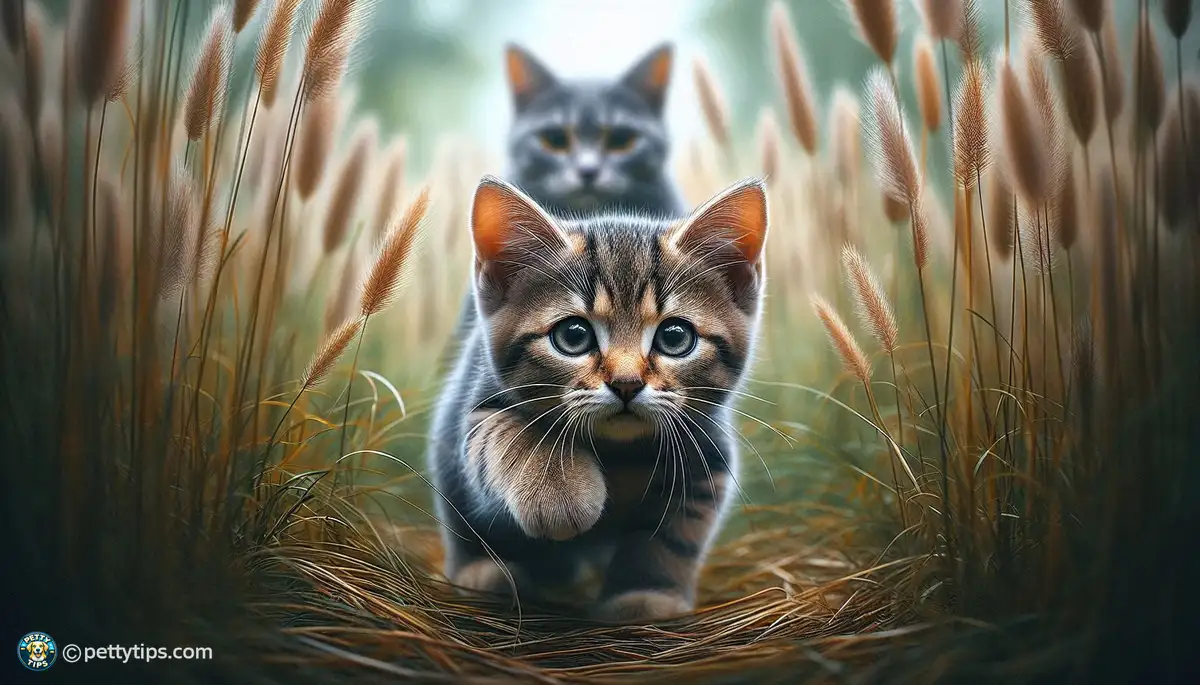- Home
- Cat Behavior
- Development of Kittens' Hunting Skills
Development of Kittens' Hunting Skills

The Instinctive Beginnings
Early Observations
Kittens are born with an innate hunting instinct that begins to emerge as early as two weeks of age. Even in the comfort of their mother's care, they exhibit behaviors that hint at their future prowess as hunters. Their first explorations involve play-fighting with littermates, pouncing on toys, and stalking imaginary prey. These early activities lay the foundation for their hunting skills to develop.
Maternal Guidance
One of the most critical influences on a kitten's hunting development is its mother. From a young age, kittens observe and learn from their mother's hunting techniques. Through mimicry and observation, they begin to understand the fundamentals of stalking, pouncing, and capturing prey. The mother cat also plays a role in teaching her kittens the importance of patience, stealth, and precision in hunting.
The Playful Practice Stage
Mock Hunts
As kittens grow older, their playtime takes on a more purposeful tone as they engage in mock hunts. This stage is crucial for honing their coordination, agility, and reflexes. Chasing after feathers, swatting at moving objects, and practicing ambush techniques become regular pastimes. These playful activities serve as valuable training sessions, allowing kittens to refine their hunting skills in a safe and controlled environment.
Sibling Dynamics
Littermates also play a significant role during this stage of development. Through interactive play, kittens learn valuable lessons about cooperation, competition, and social hierarchy. Siblings take turns being the hunter and the hunted, fostering a sense of teamwork and strategic thinking. These interactions not only strengthen their bond with each other but also contribute to the refinement of their individual hunting abilities.
The Art of Observation
Learning from the Environment
As kittens explore their surroundings, they become keen observers of the world around them. Every rustle in the bushes, flutter of wings, or scurry of small creatures captures their attention. Through these observations, kittens begin to identify potential prey, assess their surroundings for hiding spots, and anticipate the movements of their targets. This keen sense of awareness is essential for successful hunting in the wild.
Trial and Error
Part of the learning process involves trial and error as kittens experiment with different hunting techniques. They may attempt various stalking approaches, refine their pouncing skills, and adjust their strategies based on the outcome of each attempt. Mistakes are inevitable but serve as valuable learning opportunities. Through persistence and adaptation, kittens gradually develop a repertoire of effective hunting techniques tailored to their individual strengths.
The Role of Physical Development
Growing Prowess
As kittens mature, so do their physical capabilities. Their muscles strengthen, reflexes sharpen, and coordination improves, enabling them to execute more precise and efficient hunting maneuvers. The development of their senses, particularly sight, hearing, and smell, also plays a crucial role in their hunting success. These physical advancements empower kittens to navigate their environment with confidence and skill.
Agility and Speed
A key aspect of hunting proficiency is agility and speed, traits that kittens naturally enhance through regular physical activity. Climbing, jumping, and sprinting become integral parts of their daily routine, helping them to chase down elusive prey and navigate challenging terrain. Through constant practice and exercise, kittens fine-tune their motor skills and build the stamina needed for prolonged hunting endeavors.
Navigating Challenges and Obstacles
Overcoming Fear
Despite their innate hunting instincts, kittens may encounter moments of hesitation or fear when faced with unfamiliar situations or prey. Whether it's a larger opponent, a new type of prey, or a challenging environment, overcoming these obstacles requires patience and perseverance. With encouragement and support from their caregivers, kittens gradually build confidence and resilience, allowing them to tackle any hunting challenge with determination.
Adaptation to Adversity
In the wild, kittens must adapt to a range of environmental factors and obstacles that can impact their hunting success. From changes in weather conditions to fluctuations in prey availability, flexibility is key to survival. Through experience and learning from their mistakes, kittens develop the ability to adapt their hunting strategies to suit the ever-changing circumstances of their surroundings.
The Transition to Independence
Self-Sufficiency
As kittens approach adolescence, they undergo a transition from dependency on their mother to independence. This period marks the culmination of their hunting development, as they begin to venture out on their own in search of prey. While maternal guidance and sibling interactions have been instrumental in their growth, kittens now rely on their own instincts and skills to secure food and navigate the challenges of the wild.
Establishing Territories
Part of becoming independent hunters involves establishing territories and defending them against potential rivals. Kittens learn to mark their territory with scent markers and vocalizations, signaling their presence to others while also deterring intruders. This territorial behavior is essential for securing access to valuable hunting grounds and resources, ensuring their survival in a competitive environment.
The Continual Refinement
Lifelong Learning
Despite reaching maturity, the journey of refining hunting skills is ongoing for adult cats. Through continued practice, exploration, and encounters with diverse prey species, they continually fine-tune their hunting techniques and adapt to changes in their environment. Each successful hunt reinforces their confidence and reinforces their natural instincts, ensuring they remain proficient hunters throughout their lives.
Human Interaction
For domesticated cats, human interaction also plays a significant role in their hunting behavior. While their innate instincts remain unchanged, they may exhibit different hunting patterns influenced by their environment and interactions with humans. Providing opportunities for play, enrichment, and simulated hunting experiences can satisfy their natural instincts and contribute to their overall well-being.
In conclusion, the development and refinement of hunting skills in kittens are fascinating processes shaped by instinct, observation, practice, and adaptation. From the playful antics of early kittenhood to the calculated precision of adulthood, every stage contributes to their growth as efficient hunters. Understanding and nurturing these innate abilities not only enriches their lives but also strengthens the bond between humans and their feline companions.
